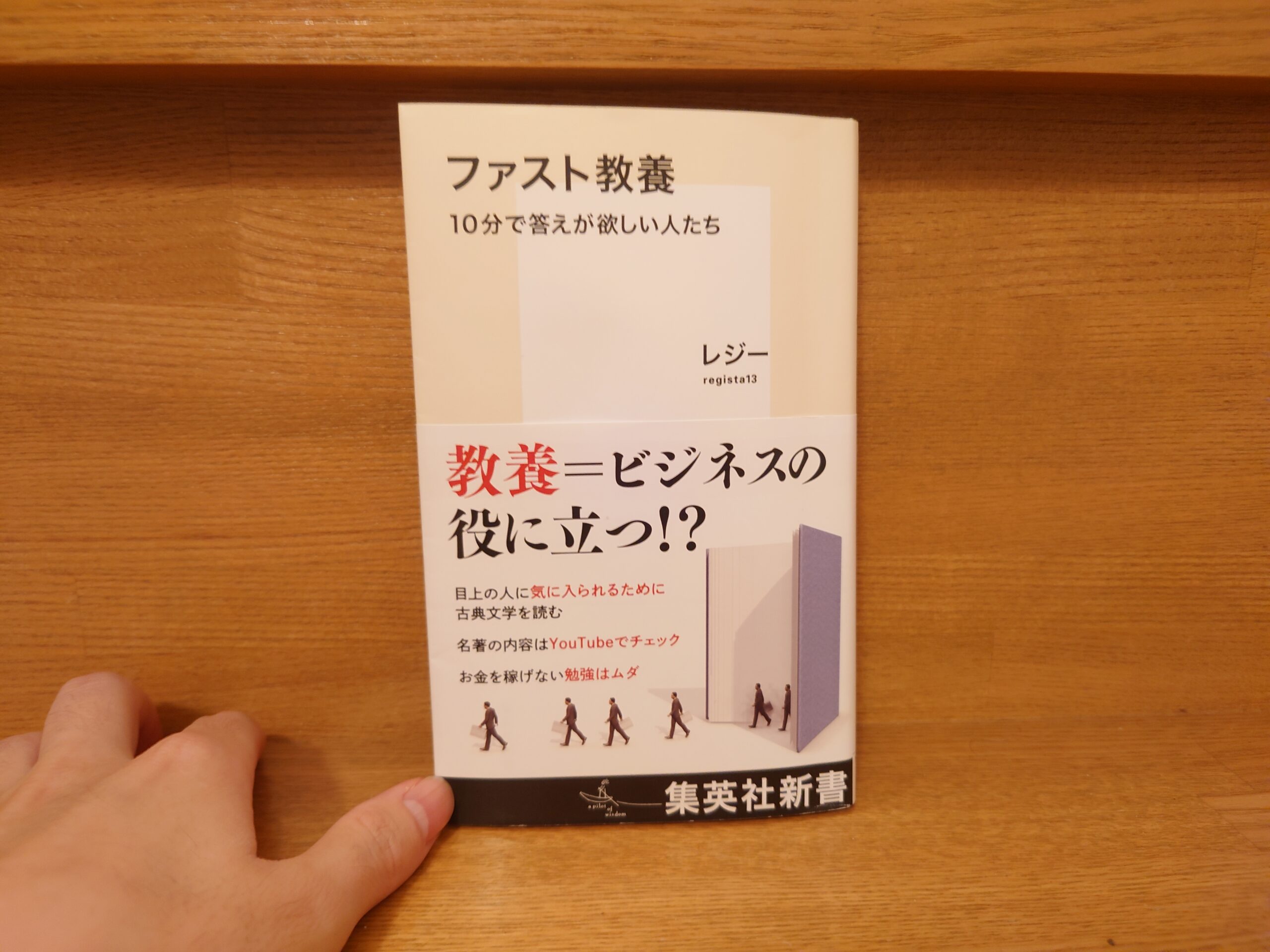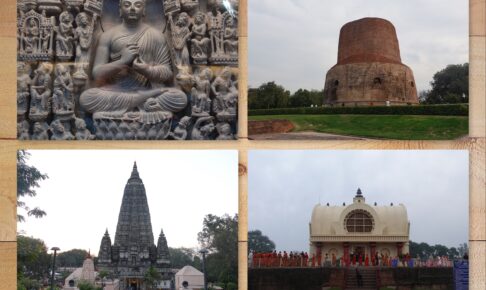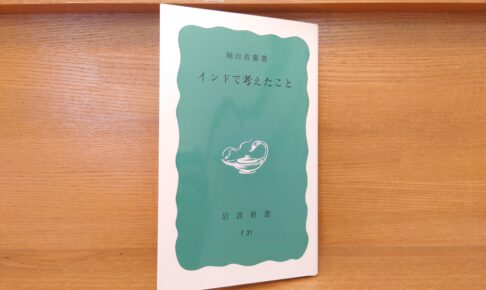Reggie's "Fast Culture: People Who Want Answers in 10 Minutes" Impressions - The Dark Side of Modern Japan from the Perspective of Culture. A stimulating work that cuts to the mechanisms of influencer popularity.
今回ご紹介するのは2022年9月に集英社より発行されたレジー著『ファスト教養 10分で答えが欲しい人たち』です。
Let's take a quick look at the book.
The stifling effect of "culture = useful for business."
AmazonProducts Page.
Reading the classics to improve social skills, checking out the contents of great books on YouTube, learning financial techniques and argumentation skills from influencers to increase "self-worth" - this kind of "culture theory" is gaining popularity among businesspeople.
The author, who works as a writer while working for a general company, named this situation "fast culture.
YouTubers who incorporate and transmit stimuli into their "culture," entrepreneurs who say "earning money is winning," charismatics who preach "skill improvement," politicians who preach "self-responsibility," and commentators who easily classify others as "idiots" ......2000s and beyond. This report analyzes the discourse that has been supported by business people since the 2000s and reveals the true nature of the "suffocating" feeling that pervades society.
Twitterのタイムラインで流れてきてものすごく気になった作品、『ファスト教養 10分で答えが欲しい人たち』。
この本のタイトルになっている「ファスト教養」とはそもそも何なのか、著者は「はじめに」で次のように述べています。重要な箇所ですので少し長くなりますがじっくり読んでいきます。
教養の現在地としての「ファスト教養」
ひろゆき、中田敦彦、カズレーザー、DaiGo、前澤友作、堀江貴文。
この面々は、ニ〇ニ一年の年末にエンターテインメントサイト「モデルプレス」で発表された「ビジネス・教養系YouTuber影響カトレンドランキング」の上位陣である。
ここまでの文字列に、何とも言えない居心地の悪さと日本の「教養」への不安を覚える人は少なくないのではないか。断定的な口調でたびたびネットを騒がせるインフルエンサーたちが発信するものは果たして教養なのか?教養とはビジネスの成功者によって語られる概念になったのか?そもそも、「ビジネス」と「教養」は同列に並べられるべきものなのか?
ここ数年、「ビジネスパーソンには教養が必要」といったメッセージがさまぎまなメディアで取りざたされるようになった。たとえば、書店を見渡してみると、ビジネス書のコーナーに『教養としての〇〇』という本が並んでいるさまをよく目にするだろう。(中略)
なぜこれほどまでに、ビジネスパーソンに向けて「教養」が押し出されるようになったのだろうか。
もちろん、教養の重要性は以前からたびたび言われてきているものではある。欧米のエグゼクティブには教養がある、それに比べて日本のおえら方は……というような比較も昔から存在していた。
しかし、最近の「教養が大事」論は、過去のものとはやや位相が異なっているのではないかと筆者は感じている。過去の「教養」という言葉と比較して、今の「教養」がとくに色濃く帯びているもの。それは、ビジネスパーソンの「焦り」である。
手っ取り早く何かを知りたい。それによってビジネスシーンのライバルに差をつけたい。そうしないと自分の市場価値が上がらない。成長できない。競争から脱落してしまう……。
今の時代の「教養が大事」論は、そんな身も蓋もない欲求および切実な不安と密接に結び付いている。ビジネスで役に立つ知識としての教養、サバイバルツールとしての教養。そういう風潮と歩調を合わせるかのごとく、中田敦彦は自身のYouTubeチャンネルを「新時代を生きるための教養」と銘打ってスタートさせ、堀江貴文は自著で「骨太の教養書を読め」と煽る。
現代のビジネスパーソンは、なぜ「教養が大事」というかけ声に心を揺さぶられてしまうのか。そして、「教養が大事」と発信するビジネス系インフルエンサーはどのようにして時代の風を捉えて勢力を拡大してきたのか。
その問いに答えるためのキーワードが、本書のタイトルにもなっている「ファスト教養」である。ファストフードのように簡単に摂取でき、「ビジネスの役に立つことこそ大事」という画一的な判断に支えられた情報。それが、現代のビジネスパーソンを駆り立てるものの正体である。
本書では、「ファスト」になっていく教養のあり方を、関連する書籍やビジネスパーソンの生の声などを頼りに掘り下げる。そうしたプロセスを通じて見えてきたのは、ファスト教養の体現する価値観を受け入れるようになっていく日本社会の変遷と現在地である。
集英社、レジー『ファスト教養 10分で答えが欲しい人たち』P8-11
This book is not simply a work written to criticize "Hiroyuki, Atsuhiko Nakata, Kazu Laser, DaiGo, Yusaku Maezawa, Takafumi Horie" and other influencers.
Rather, the work carefully follows the mechanisms of modern society as to why we are attracted to such influencers.
著者は上の文章に引き続き次のように述べています。
「古き良き教養論」の向こう側へ
このファスト教養の問題について筆者が考え始めたきっかけのひとつとして、自身の働き方に関するバックグラウンドがある。
現在筆者は企業に勤めながら、社外では音楽ブロガー・ライターとして個人で活動しており、いわゆる副業(もしくは複業)を含めてキャリアのあり方を考えている。
前者においては転職を複数回経験し、自分のスキルと市場価値を見極めながらどう動くのが最適かを日々試行錯誤している。一方で後者においては、ブログをきっかけとして商業媒体で執筆する機会を得るようになり、アーティストや音楽業界で働く人々とも関係を築きながら日本の音楽シーンに関する批評を発信している。
ニつの足場を行き来する中でたびたび感じているのは、教養を取り巻く意見について相容れないものがそれぞれの場所で流通しているということである。簡単に言ってしまえば、一般のビジネスパーソンの世界ではファスト教養が相応の支持を集めており、片や音楽業界のようないわゆる「文化系」の領域では冒頭に名前を挙げたようなインフルエンサーに対する嫌悪感が渦巻いている。
筆者は、そのような極端な分断を目にするたびに、そんな単純な二項対立で本当にいいのだろうかと疑問を抱いた。
文化を愛する人たちは、ファスト教養の「浅さ」や「不完全さ」を否定する。確かにその指摘は正しいかもしれないが、そういった意見は日々の仕事に追われるビジネスパーソンの焦燥感を理解していないからこそ発せられるものである。一方で、ファスト教養の影響下にあるビジネスパーソンが音楽も映画も読書もすべて「コスパ」と「ビジネスの役に立つか否か」で判断するような態度をとっているのを見ると、「文化はコスパや役に立つか否かで判断できるものではない」と違和感を通り越して義憤にかられることもある。
ファスト教養が流布している今の状況は批判的に捉えられるべきというのが筆者の基本的な意見である。ただ、だからと言って、ビジネス系のインフルエンサーを見下し、「古き良き教養に戻れ」といったメッセージを出したところで何の役にも立たないこともよく理解しているつもりである。
本書が目指すのは、理想を示しながらも、より現実的で、かつ実践的な行動指針を導き出すことだ。
集英社、レジー『ファスト教養 10分で答えが欲しい人たち』p11-13
どちらかといえば私はこれまで当ブログでも「文化系」の領域側から思う所を述べてきました。
レイ・ブラッドベリのSF小説Fahrenheit 451 Degrees.を題材にして「わかりやすさ」について考えた記事や、ニーチェを題材にそれこそ「教養とは何か」ということを考えてみました。
ですがやはり「ファスト教養が流布している今の状況は批判的に捉えられるべきというのが筆者の基本的な意見である。ただ、だからと言って、ビジネス系のインフルエンサーを見下し、「古き良き教養に戻れ」といったメッセージを出したところで何の役にも立たない」というのは私も感じていたことでありました。自分の無力感と言いますか、そうしたものを感じ続けていた日々でした。
ですがそんな中著者は単に彼らを否定するのではなく、それがもてはやされるようになった土壌の分析をすることでこの難問に挑んでいきます。
なぜ現代人はファスト教養に夢中になってしまうのか、そのメカニズムは単に「けしからん!」、「教養は金儲けの道具ではない」という批判をするだけでは捉えきれない巨大なものがあります。
この本ではそんな現代社会の闇ともいうべき状況を丁寧に見ていくことになります。
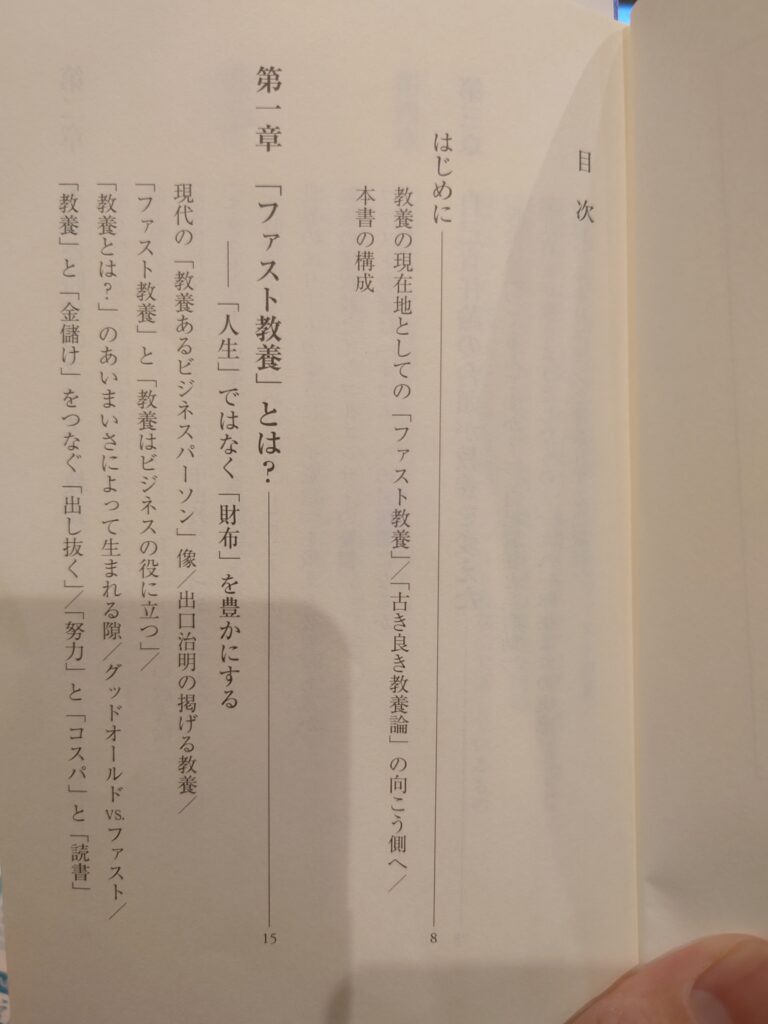
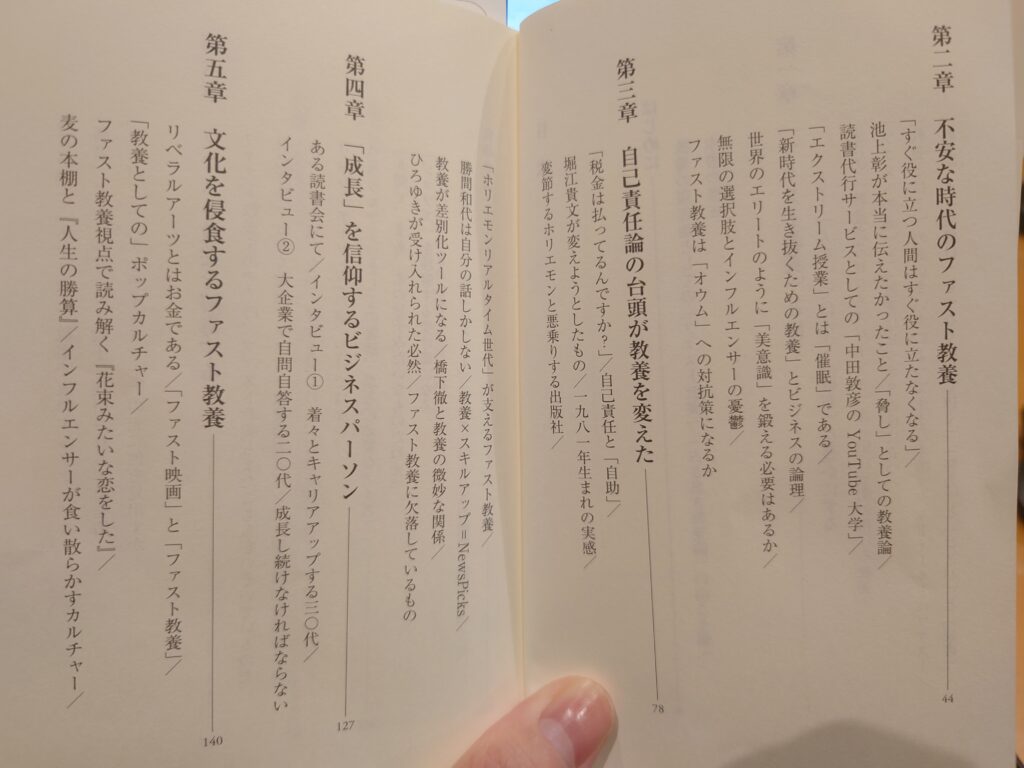
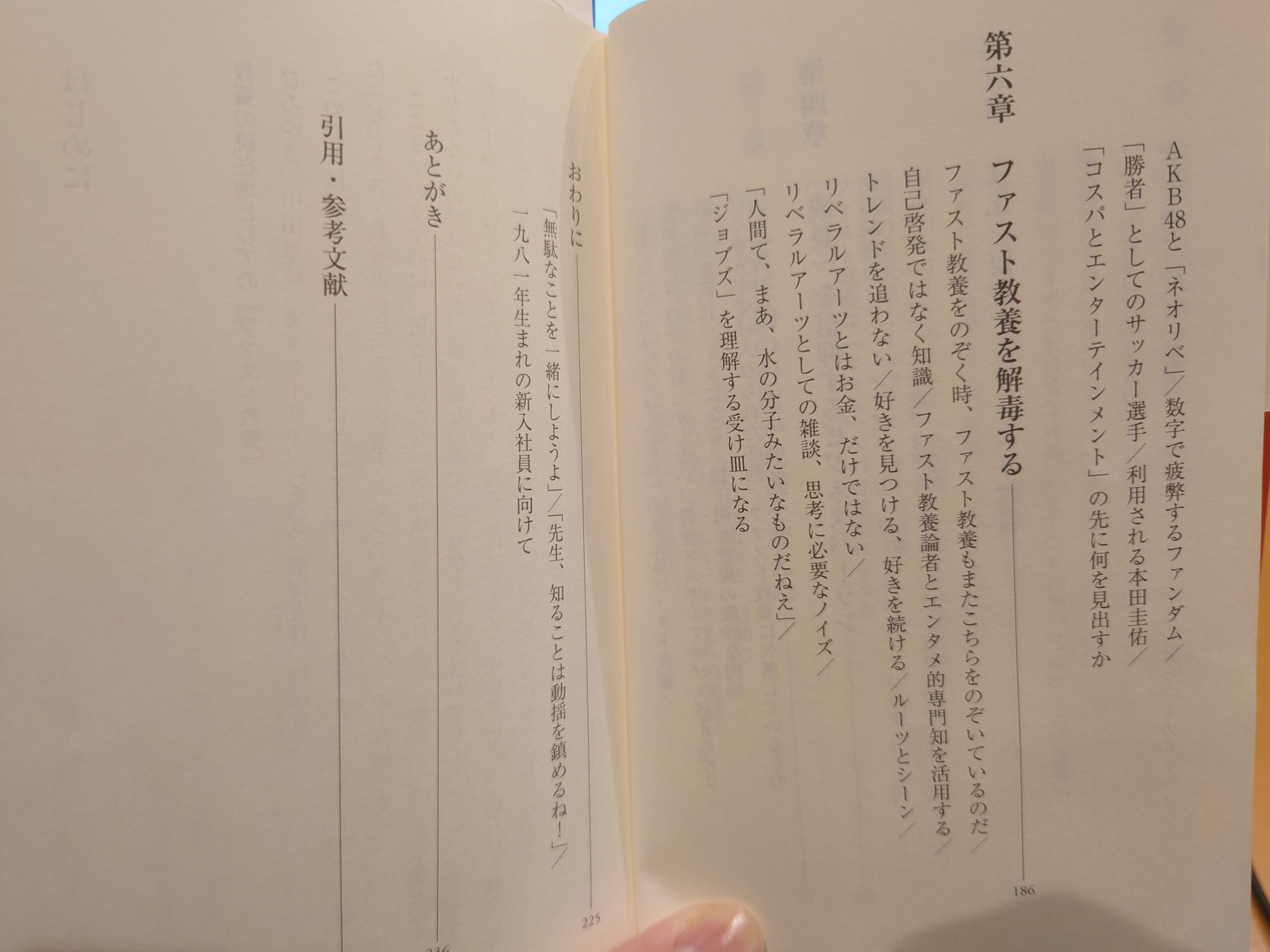
この目次を見て頂ければわかりますように、この作品では数多くの実例を用いながらなぜ「ファスト教養」に多くの人が魅力を感じるのかというメカニズムを見ていきます。このメカニズムの解説が非常に丁寧で、私達の生きる現代日本で今何が起こっているのかということを深く考えさせられます。読んでいて「よくぞここまで丁寧にファスト教養という切り口から時代背景を紐解いてくれました!」という感謝の念が浮かんだほどです。
「ファスト教養」とは何かを知るには、まずそれが生まれてくる時代背景を見ていかなければならない。そうした背景を知ることで初めて見えてくるものがある。
時代背景を学ぶこと、広い視野でじっくりと物事を考えていくこと、それは私がこれまで当ブログを更新していく上でも大切にしてきた考え方でした。
私は昨年からマルクスについて学んできましたが、それはまさに「なぜマルクスはこれほど世界に影響を与えることができたのか」ということを考えるためでした。マルクス思想が生まれてきた背景にはそれを求めていた時代精神、土壌があったはず。それを知ることは今後宗教とは何かを考える上でも大きな意味を持つだろうと私は考えたのでした。
このことについては上の「マルクス主義者ではない私がなぜマルクスを学ぶのか~宗教的現象としてのマルクスを考える」でもお話ししていますが、この『ファスト教養 10分で答えが欲しい人たち』のなかでもまさに教養と宗教についての話が出ていました。私はこの本の中でも特にその箇所が印象に残っています。
せっかくですのでその部分を紹介します。
何のために教養を学ぶのか。動機づけは個人の自由であるというのは大前提だが、歴史的経緯を振り返ると、教養というものの重要性が認識され直すきっかけになった出来事の一つとして一九九〇年代半ばに起こった一連のオウム真理教に関する事件があったという(ちょうど一九九〇年代初頭から国立大学で教養部の解体が進んでいたタイミングでもあった)。(中略)
受験における偏差値が高くても、その能力をおかしなことに使ってしまっては元も子もない。カルトにはまらないための多様な視点を身につけるとともに、人としての倫理を獲得するための方策として教養というものが求められた—そんな過去の流れと現在の状況を改めて見比べた時に、ビジネスシーンで振り回すための大雑把な知識をコスパ重視で学ぼうという今のファスト教養のあり方は「オウム」的なものへの対抗策になっているのだろうか。ビジネスでの成功に何よりも高い価値を置く人たちの示す教養が主流になることで、経済的なメリットのために深い思考プロセスや守るべき倫理観を平気で放棄できる新しい「オウム」が生まれかねないのではないか。
ファスト教養を取り巻く状況をたどっていくと、「ビジネスで成功したい」という欲望と「使えない人材になりたくない」という恐怖の狭間で平衡感覚を失っていくビジネスパーソンの姿が描き出される。次章では、そういった今のムードが生まれるに至るまでのストーリーを追いかけてみたい。キーパーソンとなるのは、本項でも名前を挙げているかつて「時代の寵児」と呼ばれた人物である。
集英社、レジー『ファスト教養 10分で答えが欲しい人たち』p75-77
ここでオウムの話題が出てきたのは非常に重要な意味があると私は思います。
私自身、自分が僧侶として生きていく上でWhat makes me any different from a parrot?"という問題にずっと悩み続けてきました。
私が今も宗教について学んでいるのもこれが大きな原点となっています。
「ビジネスでの成功に何よりも高い価値を置く人たちの示す教養が主流になることで、経済的なメリットのために深い思考プロセスや守るべき倫理観を平気で放棄できる新しい「オウム」が生まれかねないのではないか。」という著者の言葉は強く胸に刺さるものがありました。
As you will see in this book, "Fast Education" is all about how quickly you can ingest something useful for your business. Fast Education" makes sense as a strategy to help you survive the competition.
様々な可能性や立場をじっくりと考えるというプロセスは放棄され、(本人が思う)合理的思考に沿ってサバイバル競争に突き進むことになります。ですがこうした学びははたして世の中にとって良い影響を与えるものなのでしょうか、私は大いに疑問を持っています。著者も後の箇所で次のように述べています。
What is missing in fast culture
In this chapter, we have discussed the inevitability of the widespread support for the concept of fast education, which focuses on how individuals can earn money and survive. While there have been many hit titles in the so-called business and self-help book genres in the past, fast-education, which accelerates based on self-responsibility, is a phenomenon created by the overall trend in Japanese society since the beginning of the 21st century. And this momentum is likely to continue for some time to come.
I have introduced a number of key players in this debate, and one of the major common threads is their "divergence from the public sphere. They emphasize individual survival as if they reject the model of a society where people support each other as annoying. The reason why Horie, Hashimoto, and Hiroyuki all advocate the introduction of a basic income system is because the "I'll give you a certain amount of money, and you can handle the rest" approach is compatible with their strong individualistic ideology. In addition, neither Atsuhiko Nakata nor DaiGo seem to be willing to give back to society as a whole or to the weak.
In his book "Lifehack, Reward Exploitation, Individualism...The 'Inconvenient Thinking' of 'NewsPicks-kei' People" (Bungeishunju digjtal), Takesato Fujisaki, a critic and part-time lecturer at the Saitama Institute of Technology, writes In his book, "Lifehack, Exploitation of Rewards, Individualism...," he described the common attitude of the people discussed in this chapter as "individualism without a concept of responsibility," including the idea of attributing everything to individual efforts and the attitude of considering everything in society from a business perspective ("Even laws and regulations that are designed to provide minimal fairness are a bump on the eye from a business perspective").
There is nothing to blame for making an effort to learn something. A society in which the results of one's efforts are steadily returned to the individual in the form of monetary compensation is a desirable state of affairs. It is a correct strategy to focus one's study on skills that are needed in the world in order to produce results. It is only natural that we should aim for an efficient way to advance our skills, and sometimes it may be necessary to take risks and challenge ourselves to go beyond the rules.
However, efforts focused on "self-survival" make people look at those around them coldly. In addition, although "learning" by nature is usually a state in which "the more you know, the more you don't know," it is inevitably difficult to feel such an atmosphere in places surrounding fast education. Nakata's reaction to the discussion between Atsuhiko Nakata and Takumi Yobinori, who runs a YouTube channel called "Yobinori," a Japanese word for "college math and physics" (yobinori), in the book "Study Dokugaku no Neri Dake Dokugaku no Shiroku" (A Textbook for Self-Study That Makes Learning Fun) is symbolic of this.
rice paddy field in the middle of a fieldWhat percentage of the total is there that you don't know right now?
meansI think it's about 0.001 percent of what we know, in terms of sensory perception.
rice paddy field in the middle of a field: eh? Less ....... I was under the impression that you knew more.The way of learning, in which one gains a sense of omnipotence by acquiring knowledge and gaining confidence in one's own survival while feeling superior to others, seems childish in any way. The "simple decision" that Horie and Hashimoto often emphasize should become more difficult the more one learns. However, what lies ahead of the fast-educated worldview is a society where only "simple decisions" required in business situations are favored in all situations, without fostering fear of the unknown, consideration for exceptional events, and imagination and compassion for people in different positions. What do the people named in this book think about such a society that may be formed in the future? Do they express their true feelings of "I don't care about society" based on their confidence that they can survive no matter what? And will those who feel sympathy for their values internalize such ideas as "self-responsibility," "skill development," and "separation from the public" (while being tormented by the fear that one day they may drop out) and move forward to become someone else?
While there are those who would be fine with such a stance, I would like to take the position that such a society is indeed unbalanced. In this book, I would like to take the position that such a society lacks balance. While affirming at a certain level the fast-education way of learning, in which people use their education to improve their own skills, we would like to examine the ideal form of education for the next era, including an eye toward society and dignity.
Shueisha, Reggie, Fast Cultivation: People Who Want Answers in 10 Minutes, p123-126.
I feel a great threat if the "fast culture" worldview continues to infest Japan.
上にも出てきましたが「新たなオウム」がいつ生まれてもおかしくない状況です。現にインフルエンサーの顧客集めの手法はカルトに近いのではないかと私は考えています。
They are willing to say radical things, assert themselves confidently, and argue polemically. And they skillfully create enemies, abuse their opponents, and make them think they are righteous.
The only thing wrong with you is a society that doesn't understand you. But if you follow me, you will succeed. It is your enemies who are to blame, who treat you with disrespect. Do as I say.I'm going to try.You are a wonderful human being."
Then Oyasama takes away the will and initiative of the believers. The believers think they are doing it of their own volition. But what is the reality?
I cannot talk more about cults here because it would be a digression, but I would like to note again that the soil in which "fast culture" is prevalent is closely connected to it.
さて、ここまで長々とお話してきましたが私も『「ファスト教養」は「絶対悪」で、なくなるべきだ』という考えは持っていません。もっと勉強したい、もっと学びたいという思いを持つことは大切なことだと思います。
ただ、問題はその教養をどのような目的に使うのか、そもそも自分はどうなりたいのかということにあると思います。本書でも「ではこれからどうすべきか」ということを第6章でじっくりと考えていくことになります。
単に「けしからん」と切り捨てるのでもなく、だからといって傍観もできない。そんなやきもきするような現状においてこの本は非常に貴重な一冊だと思います。とにかく丁寧。相手を誹謗中傷するような攻撃的な言葉も用いません。冷静に時代背景を読み解いていくこの作品はぜひおすすめしたい名著です。
Why not pick one up?
以上、「レジー『ファスト教養 10分で答えが欲しい人たち』感想~教養という切り口から見る現代日本の闇。インフルエンサーの人気のメカニズムに切り込む刺激的作品」でした。
Related Articles












